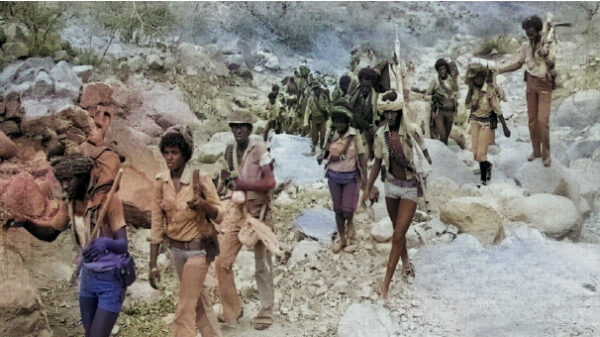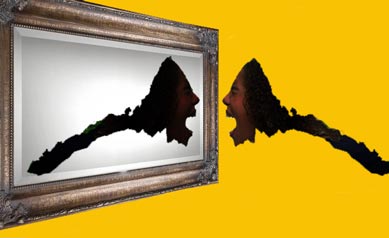PIA interview – Summary Notes

Last week began with what appeared to be a curious finding by some pro-regime of the Eritrean diaspora, in the form of a letter dated September 17, 1945 and addressed to the then US secretary of state James F. Byrnes from the then President of a USA based Sinclair Oil Corporation (a company now known as Sinclair Oil Refinery Corporation), that attempted to sway US policy on the issue of Eritrean independence. The week ended with a six hour long interview by President Isaias Afwerki with the nation’s media, aired live from the President’s office.
The President’s interview has apparently not been reported, at the time of writing this article, by its diaspora based pro-regime news outlets as well as its dedicated cadres that normally clutter social media spaces with snippets of the regime’s propaganda materials. In addition, the interview, the final part of which was aired today (Sunday September 8, 2013), has sent a wave of speculations, as regards the possible normalization of relations between Ethiopia /Eritrea, among discussants of awate.com’s discussion forum.
IA’s latest interview, lengthy as it may, might be considered to fall under two broad categories: a declared re-structuring of the regime’s party owned business enterprises and an implied change of policy towards a long time regional arch-rival Ethiopia. The full political impact of what has been delivered, by way of an atypically scheduled interview, is yet to unfold. Many assertions that were being drummed up by the regime’s own emissaries in the diaspora, i.e. with intent to camouflage the worsening economic situation in Eritrea, were shuttered one after another during that interview. For example, the Eritrean Ambassador to the UK, Tesfamichael Gerahtu has recently been on record, speaking to VOA, claiming that the power shortages in Eritrea were natural manifestation due to his alleged expansion of the economy; as well as basic maintenance issues that were claimed to be common everywhere else in the world. Other pro-regime activists were also writing similar themed papers to explain away the situation that the country continues to experience. During his interview, IA described the situation as “crisis” and his regime’s current handling of the problem was likened to “a crisis management”.
On agriculture, IA pulled the rug from under the pro-regime activist’s main talking point, which is that Eritrea has attained food self-sufficiency. In fact, to the contrary, he stated that even with all the capacity combined, including those that have been accumulated over the years, Eritrea is nowhere near attaining food self-sufficiency. The interview paints a grim picture of the current reality of the state of the country’s economy in almost all of the vital sectors. Fishing and related sectors were described by IA to be underdeveloped to the point of having no such thing as fishing capacity to speak of. The ports were said to be dilapidated and incapable of meeting local demands, let alone regional or international demands. Asmara airport was said to be useless and described as nothing more than a financial liability. In fact, according to IA’s own ranking, he rated Asmara airport below that of Tesseney airport, one that is not even in service. IA also stated that everything, from basic lighting to major manufacturing activities in the country are paralyzed due to chronic power shortages.
In relation to the private sector of the economy, the President who ruled the nation with an iron-grip for over two decades, menacingly asserted that many of those citizens who aspired to engage in businesses were in fact engaging in an illegal and crooked undertakings. He blamed that his decision to shut off the private sector was largely due to what he believed to be of untrustworthy practices of those who invested on what he considered useless ventures, such as retail and hospitality sectors and lacked the required capital to invest in the manufacturing sector. The regime of IA is known to be notorious in the expropriation of private businesses. Investor guides that are published by external agencies often cite the case of the Asmara Intercontinental Hotel saga where the regime revoked the business contract of the management to later re-open the hotel as a party owned establishment. IA also blamed corrupt officials of his administration for expanding illegal business activities in the country.
In relation to the health sector, the President defended his actions to ban private health provision on grounds that those receiving services in the public sector were not being looked after as well as those opting for private treatment. He accused Eritrean health professionals of being in lacking of basic “ethical” and “moral” values in the way they carry out their practice within the private sector setting. He expressed his admiration of medical professionals in the Sudan and other countries whom he considered to have far higher moral and ethical standards than their Eritrean counterparts. The president also cast doubts as to the competence of Eritrean doctors to provide private sector health provision. It is to be remembered that even during the Ethiopian occupation, and many years thereafter, there were so many well-known Eritrean health professionals that have also provided outstanding services in the private sector. Nowadays, just like any other citizen, Eritrean doctors are required to patrol streets at night carrying AK-47 Kalashnikovs.
In connection to the construction sector, the President lamented the corrupt and greedy nature of those who sell or rent premises as well as those who intend to invest in the construction sector. He accused land owners of illegal activities as well as being backward and not knowing the true value of the land. This is presumably the reasons that the dictator had to intervene to ban all construction activities. Such a ban also included those people who purchased construction rights from the regime in good faith but were later cheated out of the deal.
Regarding water shortages in the capital and environs, the president contended that it is the people who needed to go to where the water is and not the other way around. He criticized the residents, who are going without water supply for months on end, for being inconsiderate of other fellow citizens who live in remote parts of the country, who are even far worse off than themselves. The president did not have any foreseeable plans to present at the interview; rather he condemned the greed and inconsiderate nature of those complaining about the water shortages.
The president was upbeat about the prospect of fiber technology that is claimed to being introduced in the telecommunications sector. He did not, however, illustrate how the project was being financed or what made it a priority in the face of the dire realities of a nation going for broke.
In relation to the forceful arming of civilians and the economic losses being suffered by those who have to attend daily training as well as duties of guarding regime buildings, IA denied that such cases were widespread occurrences. It is a well-known fact that the regime threatens to shut business premises, if owners fail to send their employees to receive fire arms. Many services in Asmara and other cities are often held off during en-mass rounding of citizens or other activities related to the civilian arming, trainings and guard duties.
Reacting to a question relating to the mining revenues generated so far, IA was initially seemed to be confused and unable to understand the term “mining revenue disclosure”, and soon launched into what appeared to be tirades of verbal abuse which alleged that the people forget to factor in the fact that the mining company’s declared revenues don’t actually translate into final payouts and that the government has been underpaid to the extent of potentially having to reconsider existing mining agreements. IA, also lamented the lack of sense by those asking for the revenues to be declared, in that they fail to appreciate the fact that his regime actually spends billions of dollars a year in subsidy and development projects. He dismissed whatever revenue was being asked to be accounted for, as something that wouldn’t even meet the nation’s six months energy expenditure. He dismissed the question as immature.
The president has also answered questions regarding the human trafficking ordeals of the Eritrean youth. His responses to such questions are omitted here. The reason for the omission is to do with the fact that the IA regime is currently under investigation by multiple UN empowered monitoring bodies that are tasked to ascertain the extent of the regime’s complicity in those acts.
All in all, it was clear that IA had no intention of dealing with the above mentioned questions, i.e. other than to degrade, humiliate and threaten the populace with the regime’s well established acts of severe violations in human rights.
On Ethiopia
Perhaps, his sudden shift of tone towards Ethiopia, the references that IA made concerning some signed “contract” to develop the port of Assab, the complete silence regarding the border demarcation, the reference to Ethiopian government as “goblel” roughly meaning big guy, as opposed to what he used to call them, “kedemti” meaning housemaids, and many other cues have led to wild speculations that the regime is [or has] already taken steps to mend relations. IA has spoken of Ethiopia’s right to use the Nile for the millennium dam and belittled some of the technical concerns raised by Egypt and the Sudan. Throughout his interview, IA argued the seriousness of the power shortages that Eritrea is faced with, and spoke positively regarding the prospects of Ethiopia’s proposal to generate electricity to meet its own needs and export to regional countries.
Gone are the “mekhete” mantra and in comes “Complementary and Durable peace”.
Gone are “resolute rebuff” and in comes mutually beneficial regional projects.
Gone are the last 12 years “Woyane conspiracy” and in comes the post-cold war uni-polar hegemony over the last 20 years.
Gone are “Weyane invaded Somalia” and in comes “regional countries might have intervened for national security considerations”
Gone are “national defense” and in comes “nation building” over generations to come.
Haile



Awate Forum